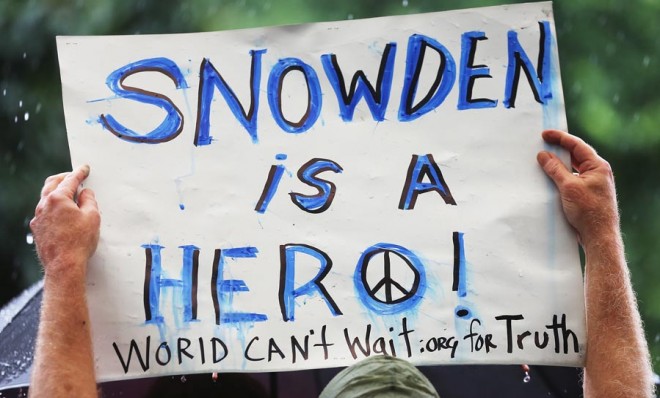Why we can't have a real debate on NSA snooping
How can you argue over the facts when the facts are classified?

A free daily email with the biggest news stories of the day – and the best features from TheWeek.com
You are now subscribed
Your newsletter sign-up was successful
"I welcome this debate and I think it's healthy for our democracy." That's what President Obama said on Friday, referring to revelations that the NSA had collected phone records from millions of Verizon customers and used a program called PRISM to analyze data sucked in from several American internet companies.
Of course, there is a debate over these NSA programs. It centers on broad arguments of privacy versus security, and has been played out mostly in the media. The specifics of the NSA's surveillance program are being parsed, but it's difficult, as they are part of a much bigger operation that largely remains a mystery.
In his book Deep State, Marc Ambinder called the NSA the "largest factory of secrets in the world," an agency that only got more leeway after 9/11. As cybersecurity expert James Lewis noted to The New York Times: "The N.S.A. classifies its lunch menu." We don't even know what we don't know about the NSA.
The Week
Escape your echo chamber. Get the facts behind the news, plus analysis from multiple perspectives.

Sign up for The Week's Free Newsletters
From our morning news briefing to a weekly Good News Newsletter, get the best of The Week delivered directly to your inbox.
From our morning news briefing to a weekly Good News Newsletter, get the best of The Week delivered directly to your inbox.
"If President Obama really welcomed a debate, there are all kinds of things he could do in terms of declassification and disclosure to foster it," Steven Aftergood, leader of the Project on Government Secrecy at the Federation of American Scientists, told The New York Times. "But he's not doing any of them.”
Any real debate over the NSA's activities, one that could lead to substantive policy changes, would have to happen in Washington. The problem? As Obama himself said, "Your duly elected representatives have consistently been informed" of what the NSA is doing.
Support for the NSA has been bipartisan. Last week, Sen. Dianne Feinstein (D-Calif.) shrugged off the revelation over phone records as simply a three-month renewal of something that had been going on for seven years. Sen. Saxby Chambliss (R-Ga.) called it a valuable program that was "nothing particularly new."
Big changes to the Patriot Act and the Foreign Intelligence Surveillance Act (FISA) seem unlikely, noted Politico's Burgess Everett and Jake Sherman. If change is coming, lawmakers are more likely to address security clearance procedures to prevent leaks rather than overhaul the NSA's surveillance policy. While liberal and libertarian lawmakers from both parties may raise a ruckus, a large majority of congressmen opted to extend provisions of the Patriot Act the last time it was put up for a vote.
A free daily email with the biggest news stories of the day – and the best features from TheWeek.com
Even if a lawmaker objects to something, he or she is hamstrung by classification rules. Rep. Jan Schakowsky (D-Ill.) was briefed on the NSA's internet surveillance program last year, according to The New York Times. Despite being critical of the NSA's actions, there wasn't much she could do about it.
"She welcomes the public debate, but it's a tough line for her to talk about because she knows more than the public," Sabrina Singh, Schakowsky's spokeswoman, told The New York Times.
Plus, it's not even clear if the public cares. A recent poll showed that 56 percent of Americans thought that the NSA's surveillance program was an acceptable way to monitor terrorism.
Keith Wagstaff is a staff writer at TheWeek.com covering politics and current events. He has previously written for such publications as TIME, Details, VICE, and the Village Voice.
-
 What are the best investments for beginners?
What are the best investments for beginners?The Explainer Stocks and ETFs and bonds, oh my
-
 What to know before filing your own taxes for the first time
What to know before filing your own taxes for the first timethe explainer Tackle this financial milestone with confidence
-
 The biggest box office flops of the 21st century
The biggest box office flops of the 21st centuryin depth Unnecessary remakes and turgid, expensive CGI-fests highlight this list of these most notorious box-office losers